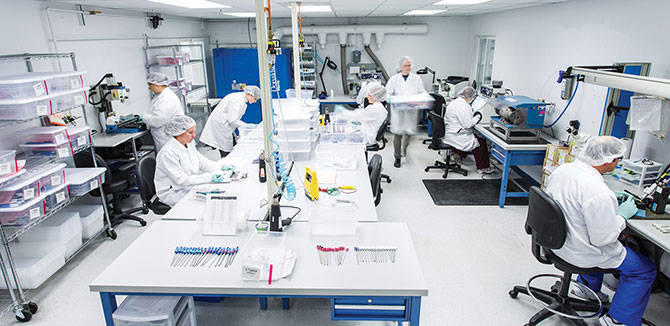Understanding the Carbon Footprint of Reprocessed Medical Devices
Medline ReNewal turned to Northwestern's MSES program to help evaluate the impact of its reprocessing efforts to reduce medical waste in landfills.

Medline is a medical supply manufacturer and distributor that strives to make healthcare run better.
Part of that work includes efforts toward reprocessing single-use medical devices to reduce the amount of medical waste in landfills. Medline wanted to determine the carbon footprint of a surgical device it reprocessed and then explore ways to improve its process to be more environmentally conscious. To do so, Medline ReNewal turned to Northwestern's Master of Science in Energy and Sustainability (MSES) program, a joint offering by Northwestern Engineering and the Paula M. Trienens Institute for Sustainability and Energy.
Medline ReNewal worked with MSES students as part of the program's project practicum — a 10-week team consulting project for a corporate, non-profit, or municipal client. Projects topics span energy technology, sustainable infrastructure and transportation, food and agriculture, sustainability and circularity, climate, and energy and sustainability finance.
"Sustainability has been a huge topic of conversation with our customers, and the more we know about the effects of reprocessing, the better partner we can be," said Marie Baenen, product manager at Medline ReNewal. "We want to be able to more accurately understand the environmental impact of reprocessing to help both Medline and our customers achieve their sustainability goals."
For their project practicum, MSES students analyzed the carbon footprint of a reprocessed tissue sealing device from ReNewal as compared to the carbon footprint of the manufacturer's single-use version of the same device.
Anna Binstein (MSES '23) was excited about the opportunity presented to her and her classmates.
"The medical device industry is known for being unsustainable for many good reasons," Binstein said. "It's hard to keep things sterile, so I was interested to be part of potentially helping 'green up' the industry in some way."
Binstein and her classmates compared the carbon footprint of the two devices and found that reprocessing the tissue sealing device was approximately 40 percent less carbon intensive than the single-use device. The primary contributor to carbon emissions turned out to be transportation, something Medline is now looking to address with electric vehicles.
"Performing a carbon footprint analysis in 10 weeks is a tall task and they were up for the challenge," Baenen said. "They were well informed, non-biased consultants who delivered results and went the extra mile to make innovative suggestions on potential process changes."
Medline ReNewal subsequently shared the students' findings in customer-facing content and created marketing collateral based on one of the team's proposed deliverables.
Baenen and her colleagues found value in working with MSES students and are exploring future partnership opportunities. The MSES students also benefited from helping an industry client on a real problem, she said.
"Working with tight timelines and high expectations from clients is an extremely valuable experience for students," Baenen said. "When students are empowered to take on projects such as these in a learning environment, they are able to see what opportunities are available in their field and network with companies that may turn into future employers."